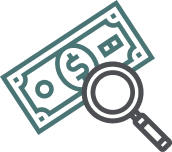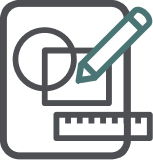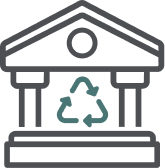Equitable Bank Standards
A clear vision
We believe in a future where banks revitalize and nourish our communities—not extract from them.
- Share your input during the Public Comment Period
- Download the Equitable Bank Standards (PDF)
- Download accompanying Resources & References (PDF)
- Learn more about the Equitable Bank Standards methodology
- Meet the EBS Council
- Read the announcement
- Subscribe to email updates for the Standards
- Contact our team to provide feedback or get support
Equitable Bank Standards
There are five key areas to measure social and environmental performance across a bank. Below we feature sample standards under each of the five categories.

Governance
description
The governance standards compel banks to establish ownership structures, business models, goals, strategies, decision-making bodies, and protocols that are in service of maximizing positive impact and minimizing the negative impact for people and the planet. They also encourage banks to ensure all stakeholders have a voice, and that accountability measures are established to ensure that the bank’s results and methods of achieving them are aligned and publicly communicated.
Why this matters: Corporations primarily seeking profits for shareholders have exacerbated inequality, accelerated environmental degradation, and excluded critical stakeholders, like bank customers and community members.
Why this matters: Corporations primarily seeking profits for shareholders have exacerbated inequality, accelerated environmental degradation, and excluded critical stakeholders, like bank customers and community members.
standard
01.A.07 | Set accountable social and environmental impact goals that the board enforces.

Lending and investments
description
The lending and investment standards urge banks to deliver value to society by using the power of finance to provide sustainable positive economic, social, and environmental outcomes while striving to avoid negative outcomes.
Why this matters: Banks have outsized power over societal outcomes in part by deciding which individuals, businesses, and nonprofits get loans to operate and expand. Banks evaluate borrowers for creditworthiness and other factors but generally have not evaluated whether loans will help or harm people, communities, and the environment.
Why this matters: Banks have outsized power over societal outcomes in part by deciding which individuals, businesses, and nonprofits get loans to operate and expand. Banks evaluate borrowers for creditworthiness and other factors but generally have not evaluated whether loans will help or harm people, communities, and the environment.
standard
03.A.06 | Ensure all new loan products, features, and programs are specifically designed to support positive social impact activities and industries.

Products and services
description
The products and services standards urge banks to deliver affordable services in an equitable, inclusive, and environmentally sound manner.
Why this matters: Mainstream bank products and services have not adequately or equitably met the needs of low income, low wealth, and historically marginalized communities and often have shortcomings in pricing, structure, or delivery methods that result in negative outcomes for people and communities.
Why this matters: Mainstream bank products and services have not adequately or equitably met the needs of low income, low wealth, and historically marginalized communities and often have shortcomings in pricing, structure, or delivery methods that result in negative outcomes for people and communities.
standard
04.B.08 | Use alternative factors to help a loan applicant show their ability to repay.

Operational practices
description
The operational practices standards compel banks to authentically integrate values of worker dignity and engagement, diversity, equity, inclusion, and environmental stewardship into their internal functions such as facilities and equipment, procurement, and communications.
Why this matters: Many corporations, including banks, have not yet created a working environment free of negative environmental impacts and where all employees can thrive, have a sense of belonging, and reach their full potential.
Why this matters: Many corporations, including banks, have not yet created a working environment free of negative environmental impacts and where all employees can thrive, have a sense of belonging, and reach their full potential.
standard
02.A.03 - 0.2A.05 | Establish a maximum CEO-to-median pay ratio that promotes pay equity.

Corporate citizenship
description
The corporate citizenship standards urge banks to advocate for regulations and support campaigns that protect the planet and advance equity in communities that have been historically marginalized.
Why this matters: Many corporations, including banks, have lobbied for greater deregulation resulting in disparate harm to low-income, low wealth, and historically marginalized communities.
Why this matters: Many corporations, including banks, have lobbied for greater deregulation resulting in disparate harm to low-income, low wealth, and historically marginalized communities.
standard
05.A.07 | Support regulations requiring demographic and racial data collection.
How can I use these standards?
Bankers
Use the Equitable Bank Standards to become an environmental, social, and governance (ESG) banking leader:
- Evaluate your current ESG and corporate social responsibility (CSR) practices and set objectives for continuous improvement
- Inspire your colleagues, board, and leadership team to integrate social impact metrics into your business planning process
- Showcase your social impact progress to gain market share with the growing segment of conscious customers
Policymakers and regulators
Use the Equitable Bank Standards to shape fair and inclusive financial regulations and policy:
- Identify minimum performance standards banks must meet to be deemed safe and fair
- Build a proactive regulatory and policy agenda centered on equity in banking
- Incentivize banks to meet the highest standards and penalize banks that fall short of the minimum thresholds
Advocates
Use the Equitable Bank Standards to determine how banking impacts your mission and goals:
- Learn how banks can help or harm your fight for economic, social, and environmental justice
- Assess banks based on how they are supporting your goals for progress on social and environmental justice work
- Shape your advocacy agenda and demands for banks, regulators, and policymakers
Bank customers and changemakers
Use the Equitable Bank Standards to assess how banks use your money:
- Learn how banks use your money to support or work against your values
- Find a socially responsible purpose–driven bank, using these standards as your guide
- Communicate to your bank how they can change to better align with what you care about
Developed in community
Developed in partnership with social impact bankers, finance experts, economic justice advocates, and academic researchers, the Equitable Bank Standards are a work in—and for—progress.